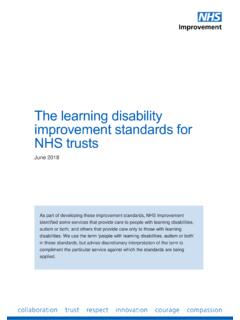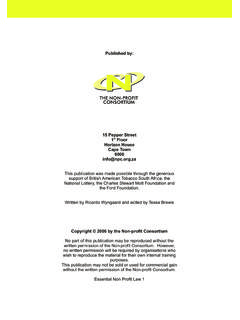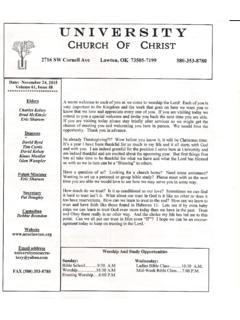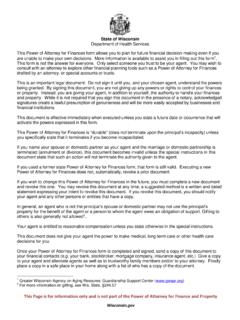Transcription of Resident Rights - HCPro
1 Resident RightsinserviceResident Rights Page 1 2012 HCPro , term Resident Rights refers to legislation that protects nursing home residents and provides for certain freedoms. Resident Rights are extremely im-portant and are necessary because they protect a vulnerable facility must train its staff, particularly CNAs, to not only be aware of Resident Rights , but to make sure those Rights are followed and maintained at all times. SNFs will need to identify and implement systems to ensure CNAs, the first step in developing an aware-ness of Resident Rights is learning the ABCs of resi-dent Rights , which are explained in this issue. This inservice also highlights residents right to freedom from abuse and neglect, which is of the utmost impaired residents pose a special challenge to meeting Resident Rights .
2 Mental confu-sion and poor judgment contribute to the potential challenges related to these residents Rights . Program PrePProgram timeApproximately 30 minutesLearning objectivesParticipants in this activity will learn how to: Recognize, describe, and apply the ABCs of Resident Rights Protect residents from abuse and neglect Care for and fulfill the Rights of cognitively impaired residentsPreparation Duplicate the quiz for participants Gather equipment for participants ( , an attendance sheet, pencils, etc.)Method1. Place a copy of the quiz and a pencil at each participant s seat 2. Conduct the questionnaire as a pretest or, if participants reading skills are limited, as an oral posttest 3.
3 Present the program material 4. Review the questionnaire5. Discuss the answersTo provide quality healthcare, there must be communication, re-spect, and sensitivity between the residents and those who provide their care. Respect for residents Rights is an important part of quality care. To ensure that residents Rights are respected, federal law requires all long-term care facilities to have written policies explaining the Rights of their Rights are found in different sections of law. We have combined them into 10 principles ( The ABCs of Resident Rights ) that cover all the Rights applicable to direct governments are also required by federal law to have a bill of Rights for residents in care facilities.
4 Most of the time, the state Rights are identical or very similar to the federal Rights , but some states have additional Rights . Your facility should have the Rights for your state posted prominently for everyone to see. the ABCs of Resident rightsFacilities must promote the exercise of Rights for each Resident , including any who face barriers (such as communication problems, hearing problems, and cognition limits). A Resident , even if he or she is determined to be incompetent, should be able to assert these Rights based on his or her degree of capability. All of your facility s residents have the following Rights : Access to visitors and private communication. Every Resident has the right to associate and communicate privately with persons of his or her choice and to send and receive his or her personal mail unopened.
5 This includes the right to access a telephone where calls can be made privately. Residents have the right to decide who can visit them and for how long. Married residents have the right to private visits from their spouse and to share a room if both live in the facility. Belongings. Every Resident has the right to keep and use his or her own personal belongings and property as long as doing so doesn t interfere with the Rights , health, or safety of others. Every Resident has the right to manage his or her own money, or to choose some-one that he or she trusts to manage funds. Also, the facility must have a mechanism in place for handling petty funds and must be able to assist residents with their finances.
6 Choice. Every Resident has the right to make choices about his or her own life subject to the facility s rules, as long as those rules do not violate a regulatory requirement. For example, residents can sleep if they choose to, take a bath in the morning or the evening, and so on. Residents should participate in planning their care, which includes daily schedules. They have the right to choose their own doctor and to refuse treatment. Note that physician choice will be limited if the facility requires privileges. Also, the physician must follow the regulations regarding the frequency of visits, restraints, psychotropic medications, and other medication rightsResident RightsPage 2 2012 HCPro , Inc.
7 Dignity, privacy, and respect. Every Resident has the right to be treated with consideration and respect for personal dignity, including the right to privacy in living arrangements, personal care, medical care, communications, visits, and meetings. express grievances. Every Resident has the right to voice grievances and recommend changes in facility policies and services to p ersons of his or her choosing. Every Resident has the right to exercise his or her Rights without interference, coercion, discrimination, or punishment. Freedom from abuse and restraints. Every Resident has the right to be free from mental and physical abuse, punishment, or forced seclusion. Every Resident has the right to be free from chemical and physical restraints, except when it is necessary for medical care and is authorized in writing by a physician.
8 Guard confidentiality. Every Resident has the right to confidential treatment of his or her personal and medical records. Residents have the right to look at or have copies of their own records. Records may not be shown to anyone else without the Resident s permission unless required by law for care coordination or regulatory reasons. help with needs. Every Resident has the right to receive services that accommodate individual needs and preferences as long as it doesn t endanger anyone else. Residents have the right to equal access to care and services. Residents also have the right to self-administer medication, if the interdisciplinary care planning team determines it is safe.
9 This will require an assessment to ensure that the Resident is capable of safely administering his or her own medications. information. Every Resident has the right to be informed of these Rights and of everything that pertains to his or her life, health, or care. This includes facility policies, services, fees, and survey results. Surveys should be posted in a location that allows Resident access without asking for assistance from the staff. If most residents in the facility use wheelchairs, it would be appropriate to have the survey results posted at wheelchair level. Information about a Resident s medical condition also must be made available to him or her. Any change in the Resident s physical, mental, or emotional condition or treatment must be discussed with the Resident and reported to the physician and the Resident s family or legal representative.
10 This includes a change in room or roommate and any accident that results in injury. When explaining medical care, the information should be presented in a manner that ensures the Resident will be able to understand. If a Resident is high-functioning, information may need to be more detailed and specific. Join activities and groups. Every Resident has the right to organize and participate in group activities, including social, religious, and community activities of his or her choosing, inside or outside the facility. Every Resident has the right to the free exercise of religion. No religious beliefs or practices may be imposed upon any resi-dent. Residents are also free to exercise their Rights as citizens of the Freedom from abuseAll residents in your facility, regardless of age or condition, have the right to be free from abuse.







